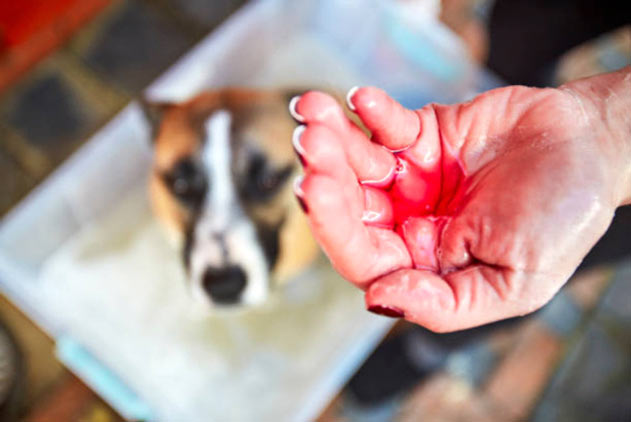With certain parasites, the discomfort they cause can be both physically and mentally debilitating, which is why it's important for pet owners to stay vigilant in protecting their four-legged friends from these pests. Tapeworms are some of the most common types of parasites found in animals — they spread quickly throughout a pet’s entire digestive tract, causing various uncomfortable symptoms such as diarrhea or vomiting. With this blog post, we'll discuss natural remedies you can use to help rid your pet of tapeworms, keeping them healthy and happy without resorting to potentially harmful medical treatments. Keep reading to find out how you can save your furry friend from this nasty pest!
Explanation of tapeworms in pets:
Tapeworms are a type of intestinal parasite that can infect both humans and animals. They are flat, segmented worms that can grow up to 50cm in length and attach themselves to the walls of the small intestine using their hook-like mouthparts. Tapeworms get their name from their body structure, which resembles a tape or ribbon. These parasites are typically contracted by pets when they ingest infected fleas, rodents, or other animals that act as intermediate hosts for the tapeworms. Pets can also become infected through contact with contaminated soil or water.
Life Cycle of Tapeworms in Pets:
The life cycle of tapeworms starts when a pet ingests an infected flea or animal. Once the tapeworm larvae are inside the pets digestive system, they develop into adult worms that attach themselves to the intestinal wall and start producing eggs. These eggs are then passed out of the pet’s body in their feces, which can infect other animals if ingested. The eggs then hatch into larvae in the intermediate host, and the cycle continues.
Causes and Symptoms of Tapeworms in Pets:

The most common way pets contract tapeworms is through the ingestion of an intermediate host. For instance, dogs often become infected with tapeworms by swallowing fleas during grooming, or by hunting and eating wildlife infected with tapeworms or fleas. Cats can also contract them by eating infected rodents.
The symptoms of a tapeworm infection in pets can vary, but some common signs include:
- Excessive licking or biting at the anal area due to irritation caused by the worms.
- Unexplained weight loss despite having a good appetite.
- Signs of general discomfort, such as restlessness or changes in behavior.
- In severe cases, pets can show signs of malnutrition and anemia.
It's important to note that some pets might not show any symptoms at all even though they are infected. Therefore, regular vet check-ups are crucial for early detection and treatment.
Natural Remedies for Getting Rid of Tapeworms in Pets:
- Pumpkin Seeds: Raw, organic pumpkin seeds have been proven to be an effective dewormed for pets. They contain a compound called cucurbit that paralyzes the worm and causes it to release its grip on the intestinal walls, making it easier to eliminate through feces. Simply grind the seeds and mix them with your pet's food once a day for up to seven days.
- Garlic: The sulfur compounds found in garlic can help kill parasites in pets, including tapeworms. However, it's important to consult with a veterinarian before giving your pet any form of garlic as too much can be toxic.
- Diatomaceous Earth: This fine powder is made from the fossilized remains of marine organisms and can be sprinkled on your pet's food to eliminate tapeworms. It works by dehydrating and killing the parasites.
- Apple Cider Vinegar: Adding a small amount of organic, raw apple cider vinegar to your pet's water bowl can help make their intestinal tract less hospitable to tapeworms.
- Herbal Supplements: Various herbal supplements have been used for centuries as natural remedies for parasitic infections in pets. Some commonly used herbs include wormwood, black walnut, and cloves.
Nutrients that boost the Immune System:

In addition to using natural remedies, it's important to boost your pet's immune system to help them fight off tapeworms and other parasites. Some nutrients that can help strengthen their immune system include:
- Probiotics: These are good bacteria that help maintain a healthy balance in the gut and improve overall digestive health.
- Omega-3 Fatty Acids: These healthy fats are essential for immune system function and can be found in fish oil, flaxseeds, and certain types of algae.
- Vitamin C: This powerful antioxidant can help stimulate the production of white blood cells that fight off infections.
- Zinc: A deficiency in this mineral has been linked to weakened immune systems. Make sure your pet's diet includes zinc-rich foods like beef, chicken, and eggs.
Preventing Tapeworm Infections in Pets:
Prevention is always better than cure when it comes to tapeworms. Here are some tips to help protect your pet from getting infected:
- Keep your pet's living area clean and free of fleas by regularly vacuuming, washing their bedding in hot water, and using flea prevention products.
- Practice good hygiene when handling your pet, especially after they've been outside or around other animals.
- Always wash your hands before and after handling raw meat or fish as these can be sources of tapeworms.
- Regularly check your pet's fur for any signs of fleas or flea dirt.
- Maintain regular vet check-ups and deworm your pet as recommended by your veterinarian.
Addressing Tapeworm Infections in Multi-Pet Households:
If you have more than one pet in your household, it's important to treat all of them for tapeworms if one of them becomes infected. This is because pets can easily pass the infection to each other, especially if they share living spaces or spend a lot of time grooming each other. It's also crucial to keep their living areas clean and free from fleas to prevent the spread of infection. Consult with your vet for the most effective and safe treatment options for all of your pets.
Conclusion:
Tapeworms are a common parasite that can infect pets. While they may not always show symptoms in infected animals, it's important to regularly check for signs of infestation and take preventive measures. By using natural remedies and practicing good hygiene, you can help keep your furry friend free from tapeworms and ensure their overall well-being. If you suspect your pet may have a tapeworm infection, consult with your veterinarian immediately for proper diagnosis and treatment. Together, we can keep our pets healthy and happy! So, stay vigilant, take preventive measures, and utilize natural remedies to protect your beloved pets from tapeworms.




